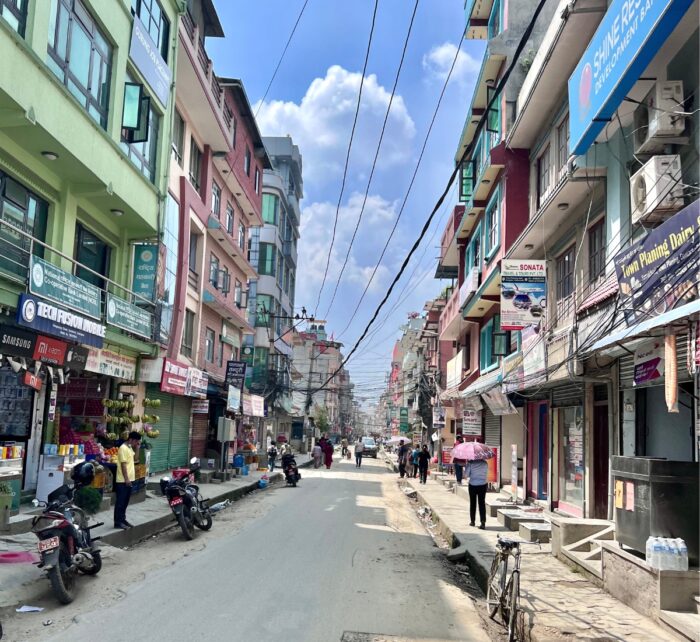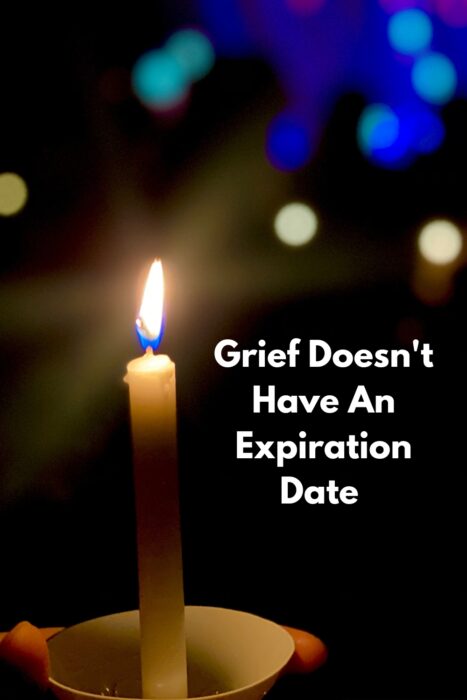When you lose a loved one you don’t get over it, you go through it.
The “through it” part is individual. You can’t delegate it to someone else or procrastinate it long enough for all of the pain to go away.
You will have to face it to begin your healing process or it can eat you up inside.
It can feel like a very lonely road you are forced to travel down.
Grief doesn’t have an expiration date.
There isn’t a specific amount of time or days that indicate when someone should be “over it.”
In fact, as more time passes different fears can set in… Will I remember all of the expressions on their face, their voice, their smell, their sayings, their laugh, and their handwriting?
How do I honor their life and their memory… when most have moved on from their death?
Grief is a process with stages. (Denial, Anger, Bargaining, Depression, and Acceptance)
“The year of firsts” after you lose a loved one can feel like you’re walking through a fog being hit by giant crashing waves… even if you aren’t ready for them.
Each “first” can feel like another wave as you encounter another holiday or milestone, pass through another life stage, or recall a song, a smell, or a location that triggers a memory.
Sometimes grief can hit you seemingly out of nowhere on an ordinary day.
It’s all part of the process.

Hurt Around the Holidays
The holidays can be an extremely painful and stinging annual reminder that a special person is absent from holiday traditions and gatherings
….even if the grieving person doesn’t show it on the outside.
The sting from the loss is like a wound that never fully heals.
During a time of year focused on celebrating so much joy, it can feel as if there is a heavy gray cloud hanging over you that keeps the weight of your grief nearby…
That cloud you feel looming over you is a reminder that a flood of emotions could drop at any time, like raindrops during a sudden downpour.
It’s this weird dynamic of life still moving on all around you while a part of you feels frozen and even paralyzed at times.
It can be hard to find motivation for the simplest tasks or even find joy during events that you previously looked forward to.
Why I Share My Pain
I love it when people discover my site when they are searching for adventure…
…but many also find my site year-round because they are searching online for someone who understands the pain that comes from experiencing the death of a loved one…
…and they stumble across my article about missing my mom or my special needs brother or the first article I ever wrote on my site called “Why Death Has Made Me Want to Live.”
The most vulnerable, painful parts of my story are ironically what draw others in and what they connect to the most.
I’m always humbled when total strangers feel safe enough to share their stories with me because of our shared universal experience of loss.
I’ve had several readers share that it was the first time that they wrote down their traumatic story of loss to share with another person.
I don’t take it lightly when they bravely entrust and share their pain with me.
The grieving process can feel so lonely and it’s important to know that you aren’t alone.
We’re Never Fully Prepared For Death
We know that no one lives forever and yet death always feels so shocking when it happens.
We are never fully prepared for it, no matter the circumstance.
Of course, many deaths are easier to try to rationalize… if there was a long-term illness or if the person was elderly.
The FINALITY of death is what stings the most.
It aches our hearts in ways that we never anticipated that it could…even if we knew that their death was quickly approaching.
The aches and the vacuum can feel both physical and emotional. The yearning for what is now absent is hard to express because it’s such an uncomfortable feeling.
There is no way to fully prepare for it.
I’ve personally experienced the death of my mom from cancer which was a downward progression over time. I was in the room when her spirit passed from this life to the next.
I’ve also experienced the death of my special needs brother who went into the hospital for pneumonia, which he had overcome many times…but that time he didn’t. I wasn’t at the hospital the day he died.
It’s challenging to find closure if we aren’t given the gift of more time.

Sharing Your Grief Story Can Be Healing For Yourself And Others
While I was in Nepal in May of 2022, I received a message from a reader that originally reached out to me in 2014 because of our shared faith and siblings with severe special needs.
They gave me an update on their life and how a conversation among us as total strangers, with similar shared life experiences, sparked a change in them, that set their lives on a whole new trajectory.
Little did they know that their update came to me during that EXACT moment that I needed to hear it.
The nature of that trip was very delicate in so many ways. One day I may write what I can share about it or I might have to reconcile that some of those experiences were just for me and the small circle of people I got to experience them with.
I’m sure that she debated whether or not to randomly contact me 8 years later out of the blue, but her encouragement was just what I needed that day.
There are people on the other side of our stories who need to hear our stories to help them feel less alone in theirs.
Will Your Pain Be Your Power or Your Prison?
None of us escape pain in this life.
It’s how we choose to move forward from that pain that has the power to help others or it has the power to imprison us with invisible walls that keep us isolated from others.
I’ve learned that the vulnerability of my story has been helpful for my healing process and it’s also helped others feel less alone …BUT that gift isn’t unique to me.
I’ve experienced loss and most likely so have you because you were drawn to read this article.
Grieving can often feel like a secret society because our culture no longer wears our grief on the outside with morning clothes…so instead it’s like a secret that we keep on the inside.
Many times we keep this secret to ourselves because we don’t want to cause discomfort for others.
We hold it in because don’t want to bring the mood down or we might have shared our grief in spaces where it was misunderstood or wasn’t received with empathy.
We have to navigate finding safe people and safe spaces where we can vocalize our pain.
If you’ve been vulnerable sharing your story in the past and it brought more pain, I’m so sorry.
Please don’t let that keep you from seeking safe spaces and people to share it with in the future.
I’ve found that when you lead with vulnerability you also become a safe space for others to share their pain.
We have so much more in common with each other than we realize.
The brokenness in us is often what connects us.
All of my favorite people are broken.
Check in On Your Friends and Family
It doesn’t matter how many years have passed. Grief for a loved one doesn’t expire after a set amount of time.
The present pain may fade, but the void is still there.
There are so many factors that impact the depth of grief, including how close a person’s relationship was to the person who died.
The distance of your relationship from the deceased also impacts your ability to feel the depth of its impact.
The closer you are to the deceased, the more empathy you naturally have for the magnitude of what your friend or family member is going through.
We tend to only truly understand the losses that we’ve personally experienced.
That doesn’t excuse us from empathy toward others.
It does help us understand why certain losses may tug at our hearts stronger than others.
What Can You Do For A Grieving Family Member or Friend?
Ask them to share some of their favorite memories of their loved one with you.
If you didn’t know their loved one, you can even ask what their name was as a way to honor them and their memory.
Be mindful of holidays and annual traditions that could be triggering (Birthdays, Mother’s Day, Father’s Day, Anniversary, Christmas, Easter, etc) and acknowledge their loss, even if it’s been years since their passing.
If they have to be at a public celebration with family or friends, acknowledge that they may need to give themselves a “time out” if they feel overwhelmed by emotions and don’t want to affect the celebratory mood or have attention drawn or spotlighted on their grief by others.
I remember wishing that I could fast forward the awkward moments with people who didn’t know what to say after one of my family members had died …or some just said nothing which sometimes was a relief and sometimes made me feel unseen.
Don’t wait for them to tell you what they need…because they most likely won’t.
If you see a need, proactively do it (Mow their grass, drop off a meal, take their laundry, help with carpool) and allow the space for it to be done at a distance… without them feeling like they have to host you when you stop by.
Do your best to try to “read the room” and be sensitive to cues when they indicate that they want… and don’t want company.
If they have kids, sometimes a kid just needs a little escape to hang out with other kids doing something fun to help them “feel normal” for a brief moment as they process their grief.
Let them know that you are a safe space to talk… or not talk about it whenever they need it.
Grieving Resources
I want to share a few resources on grief that I recently discovered. A huge step is reaching out when you are hurting and these are spaces that “get it.”
- National Alliance for Children’s Grief
- HealGrief
- Bereavement For Special Needs Siblings
- All There Is with Anderson Cooper (A podcast about grief)
Please know that you don’t have to grieve alone and that you are SEEN.



Great words. Love reading them.